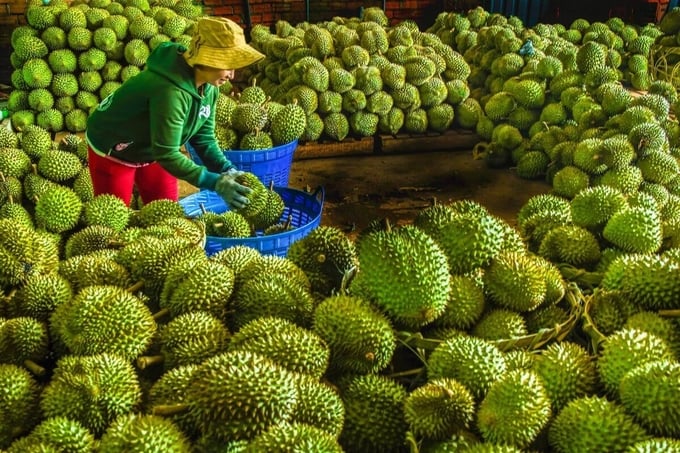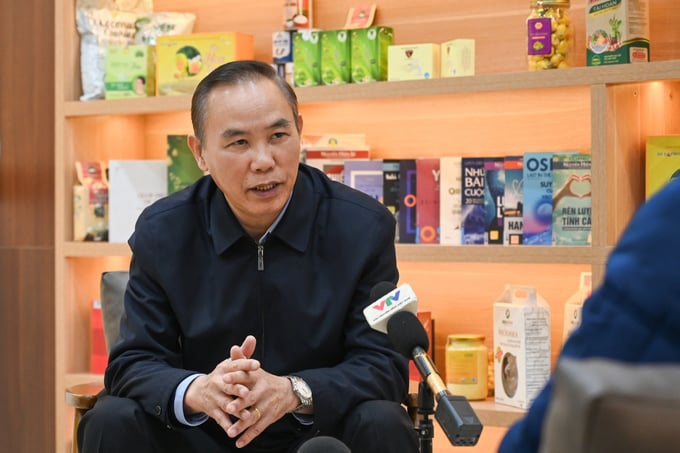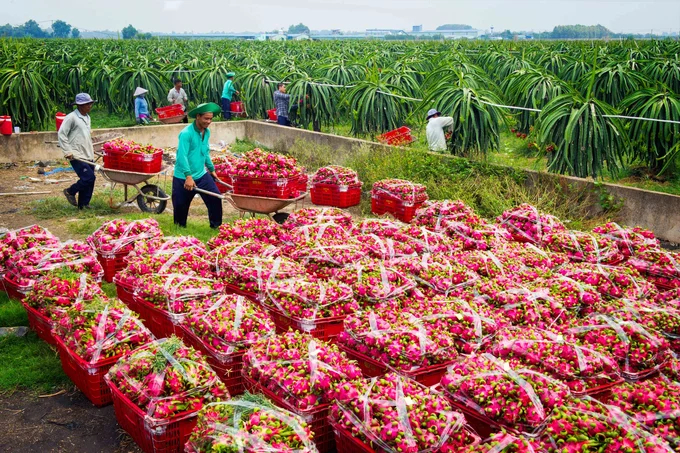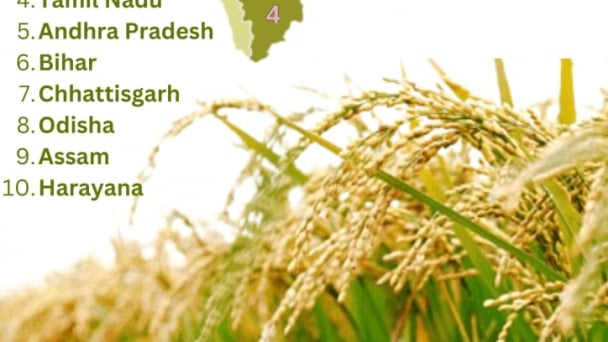June 21, 2025 | 01:27 GMT +7
June 21, 2025 | 01:27 GMT +7
Hotline: 0913.378.918
June 21, 2025 | 01:27 GMT +7
Hotline: 0913.378.918

In February 2024, the export value of agricultural, forestry, and fishery products amounted to $4.48 billion, representing a decrease of 16.5% compared to January 2024.
Some primary export commodity groups experienced growth compared to the same period in 2023, resulting in a significant increase in export turnover. Agricultural products led the surge, reaching $5.18 billion, up 55.7%. Forest products followed with $2.9 billion, marking a 59.7% increase, while seafood reached $1.37 billion, up 28.9%. Livestock products amounted to $78 million, showing a 15.1% increase, and production inputs reached $309 million, indicating a rise of 13.6%.
In February alone, the export value of agricultural, forestry, and fishery products reached $4.48 billion, down by 16.5% compared to January 2024. Nevertheless, compared to the same period last year, main agricultural products saw a significant increase to $2.34 billion (up by 21.6%), main forestry products amounted to $1.34 billion (up by 40.3%), and aquatic products reached $620 million (up by 1.9%). Livestock products stood at $34 million (up by 6.2%), while production inputs were recorded at $142 million (down by 7.4%).
Most key products achieved a higher export value compared to the same period last year. Wood products amounted to $1.68 billion (up by 59%), coffee reached $1.38 billion (up by 85%), vegetables and fruits stood at $970 million (up by 72.8%), rice reached $708 million (up by 49.8%), cashew nuts amounted to $595 million (up by 68.2%), and shrimp stood at $403 million (up by 20.5%). The export value of Pangasius products alone experienced a slight decrease of 0.7%, reaching $224 million.
"Recent export activities, particularly in the seafood and agricultural sectors, have shown promising signs of recovery. However, it's imperative to ensure that this recovery is sustainable and not merely a temporary upswing driven by fluctuations in food demand in major markets," commented Deputy Minister Phung Duc Tien.
To maintain the Vietnamese AFF brand's position on the global stage, each product must target specific consumer demographics.

Deputy Minister Phung Duc Tien emphasized the need for Vietnamese agricultural products to penetrate new segments and markets. Photo: Quynh Chi.
Deputy Minister Phung Duc Tien highlighted that the Ministry of Agriculture and Rural Development has suggested the De Heus Group to concentrate on exporting chicken to the Halal market, a pivotal market encompassing 2.2 billion people, constituting the majority of the global population.
"While we have made inroads into numerous new markets, focusing on demanding markets, particularly the Halal market, will facilitate the expansion of our agricultural products into diverse segments and markets. If executed smoothly, Vietnam could export 1,000 tons of chicken monthly. This milestone would signify a significant turning point in Vietnam's endeavor to broaden its export horizons," analyzed the Deputy Minister.
The United States, China, and Japan remain Vietnam's top three markets. In the first two months of the year, export values to the United States accounted for 21.5% (up by 77.3%); China represented 21% (up by 47.9%), and Japan constituted 7.2% (up by 29.2%).
Deputy Minister Phung Duc Tien outlined that the Ministry of Agriculture and Rural Development is prioritizing leveraging free trade agreements (FTAs), notably the CPTPP and EVFTA agreements, to bolster the export of key AFF products and assist businesses in securing new export orders. Additionally, efforts will be made to support trademark protection and geographical indications for Vietnam's promising export products abroad.

The Ministry of Agriculture and Rural Development remains committed to negotiating with countries to broaden export markets for agricultural, forestry, and fishery products.
The Chinese market still holds significant potential for market expansion. Thus far, Vietnam has engaged in trade agreements for items such as meat, coconuts, and frozen durian. Going forward, the Ministry of Agriculture and Rural Development will pursue negotiations to further open doors for seafood and watermelon, leveraging geographical advantages. Simultaneously, the development of smart border gates and rail and road transport networks will be prioritized to enhance conditions for transporting agricultural products to China, thereby minimizing logistics costs and increasing income for farmers.
In ensuring the high quality of Vietnamese AFF products, Deputy Minister Phung Duc Tien emphasized that the Ministry of Agriculture and Rural Development will promote the application of science and technology in production and farming. Regarding rice, given the global food security concerns stemming from political instability, the Ministry is resolute in maintaining 7.1 million hectares planted nationwide with 89% high-quality rice varieties, thereby ensuring rice yield. In aquaculture, Deputy Minister Phung Duc Tien underscored the need for Vietnam to enhance capacity and upgrade equipment for aquatic research facilities, fostering opportunities for breeding autonomy and the development of new aquatic breeds.
Regarding the domestic market, the commodity market in the first two months of the year has demonstrated relative stability. Supply for the occasion before, during, and after the Lunar New Year of Giap Thin is assured, with increased purchasing power and no sudden price spikes observed. Notably, essential goods such as food, fresh produce, processed food, and fruits, particularly high-quality Vietnamese products and OCOP products, have experienced robust consumption.
Translated by Quynh Chi

(VAN) Last week, the U.S. Department of Agriculture (USDA) released its June World Agricultural Supply and Demand Estimates (WASDE), raising projections for both Indian rice production and U.S. rice imports for the 2025/2026 marketing year.
/2025/06/17/2344-1-131758_261.jpg)
(VAN) Amid tariff risks and growing trade barriers in the U.S. market, Australia is emerging as a promising destination to sustain the growth momentum of Vietnam's shrimp exports.
/2025/06/17/2013-1-nongnghiep-112009.jpg)
(VAN) This notable growth trend reflects the global taste for fresh, nutritious fruits and the expanding use of lychees across various sectors.

(VAN) The political and cultural insulation of Japan’s beloved grain is falling apart, and experts warn the country’s relationship with the staple will have to adapt.

(VAN) Noting risks, report examines impacts of avian influenza, changing trade patterns since 2022, fish fraud, and shipping industry’s net-zero goals.

(VAN) Mr. Tran Quang Bao, General Director of the Forestry and Forest Protection Department, met and worked with the International Wood Products Association to promote cooperation in the field of timber trade.

(VAN) China's outbound shipments of rare earths in May jumped 23% on the month to their highest in a year, though Beijing's export curbs on some of the critical minerals halted some overseas sales.